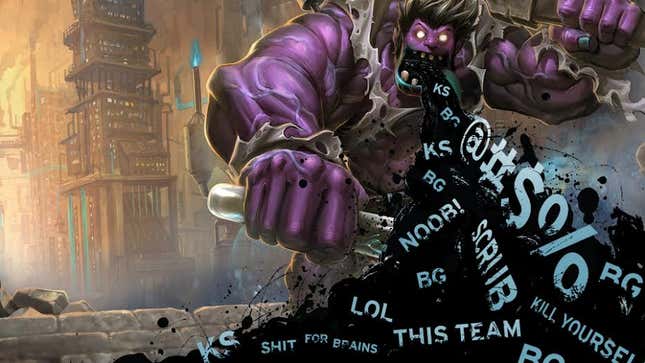
For many people—even many gamers—"toxicity" and League of Legends go hand-in-hand. The game has a longstanding reputation for harboring a noxious player-base that continues to spew hateful epithets at one another despite developer Riot's best intentions to make them stop. The truth is a bit more complicated.
By design, League of Legends is a game that produces conflict. I don't mean the in-game conflict of wizards and demons killing each other, but everything that happens around and inside that fictional space. At every step along the way of a given game of League, the people playing it encounter innumerable scenarios that give rise to tense moments between one another. Sensitive and tactful players can often massage these out of existence. But tension can just as easily escalate into full-on fights. These spats culminate in much of the toxic behavior League is known for.
If there's anything uniquely toxic about League of Legends, then, there's also something uniquely antagonistic embedded in the very structure of the game.
Humiliation Is Built Into The Game
Playing League of Legends is a process. It's not as simple as picking it up and pressing start. There are five distinct phases in a standard game, each of which creates its own unique opportunities for tension to bubble up and fights to break out. I'll break it down:
Pre-Game: Champion Selection
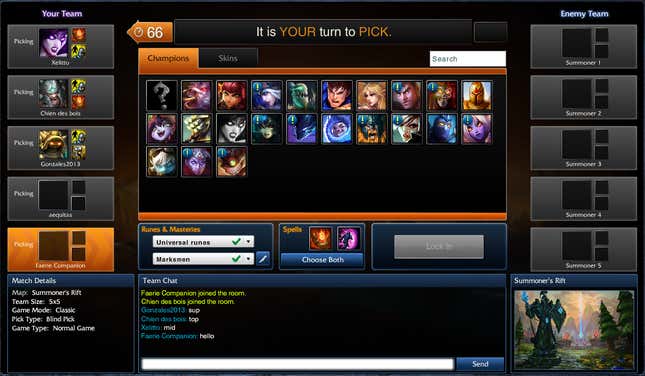
This is when you first get grouped together with teammates and plan out the game ahead. Players call out their preferred positions on the team by typing into a chat box at the bottom of the screen, select the champion they're going to play as, and outfit them with specific spells they can cast during the fight. Already, there's room for disagreement. And this is before you're even playing.
A proper League team is made up of five distinct positions, each of which lends itself to a particular play style and type of character—melee tanks go top, ranged archers and snipers go on bottom, and so on. Everyone has a preferred position and favorite champion.
So if two people both want to play on the bottom lane as the team's ADC? ADC is a specialist role that requires you to play in the bottom lane alongside an ally support champion—the two of them working together to build up the ADC's attack damage over the course so they can carry the team to victory towards the end (hence the name). There can only be one ADC, so one of the players is going to have to back down. That doesn't always mean they do. Two players vying for mid or support or whatever could start trading barbs back and forth. One of them might leave the still-nascent game entirely, which forces all ten players back into the matchmaking queue. Or—and this is the worst possible option—they'll just ignore the requests of their teammates and pick whoever the hell they want to. Doing so means that pre-game unease seeps into the match itself, as different players continue to bicker about who called what position and start demanding things like: "Don't be a douche."
Regardless of how all the pre-game kerfuffles get sorted out, the clock is ticking. Eventually, foot soldiers known as "minions" start spawning, and the battle gets underway. Unless a team has already been worked up into enough of a rage that, say, someone refuses to budge from their desired lane despite their allies' objections, everyone still wants to do their best to defeat the opposition. That doesn't mean they can't also harbor resentment about what just happened, though.
Early Game: Laning
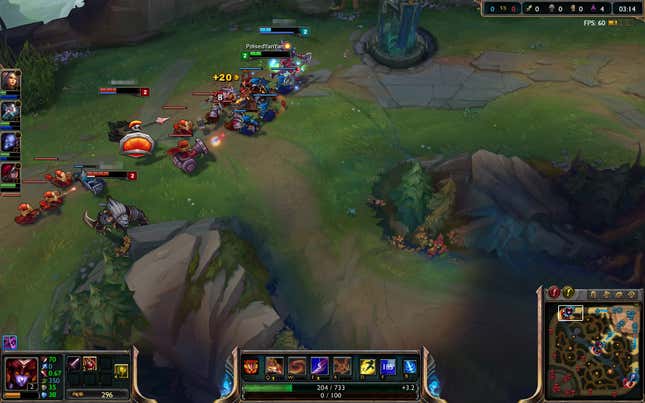
At the start of the game, players stick to their assigned lanes and positions and try to level up their characters as fast as possible so they can unlock more powerful abilities and buy better gear. If things are going smoothly, this is usually the quietest part of the game. Everyone focuses on the task at hand and makes sure to stay alive. The most you'll hear is an occasional "gj" or "ty" to commend someone for scoring an early kill or thanking an ally who jumped into your lane to help ambush an enemy or two. At worst, people may start accusing one another of stealing valuable early kills—a "ks."
Things don't really go smoothly in League, though—that's the whole point. People have to start dying eventually. Evenly matched teams will trade kills back-and-forth, maintaining a relative balance that keeps the competition alive and going. But the constant pressure quickly exposes gaps in a team's lineup.
If one team is doing well, that means the other isn't. A weak player who isn't handling his champion well might keep dying over and over again. His teammates will start to moan that he's feeding the enemy: giving an opponent easy gold and experience that'll make the champion all the scarier later in the game. He could apologize and promise to do better. But he could just as easily lash out: start blaming the team for sticking him in a position he didn't want to play in the first place, or his shitty lane-mate who's not keeping him alive the way they're supposed to.
And so the blame game of League starts. It doesn't really matter who's right or wrong by then. What's important is that the team has started to lose faith in one another.
Mid-Game: Ganking and Roaming
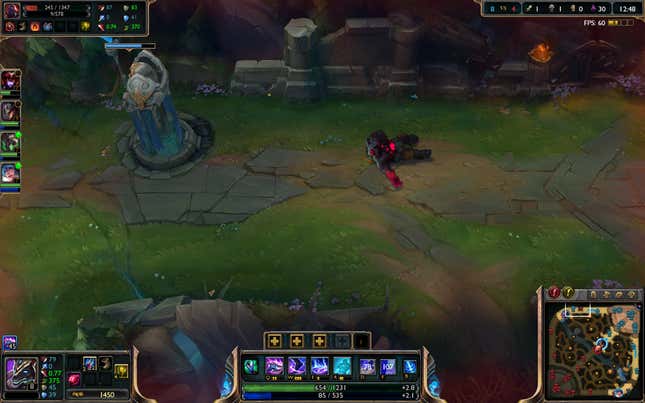
After each team has leveled up their characters to a certain point and taken down a few of the enemy team's turrets, positions get more lax. Players move around the entire map—fighting the opponents they encounter or joining up to take out the most formidable of the computer-controlled monsters for advanced rewards.
If a team isn't communicating effectively in the mid-game stage, things can easily go off the rails. Players end up wandering around all corners of the map—isolating themselves, which turns them into easy prey (read: more food) for the enemy. Mistakes from the early game become problems for the whole team now, too, because an overfed opponent will roam the map and slaughter anything in sight.
As the structure of the game loosens up, so too does a team's negativity. It's normally around this time in a bad game that I've seen players start lashing out blindly.
Late-Game: Team Battles and Pushing
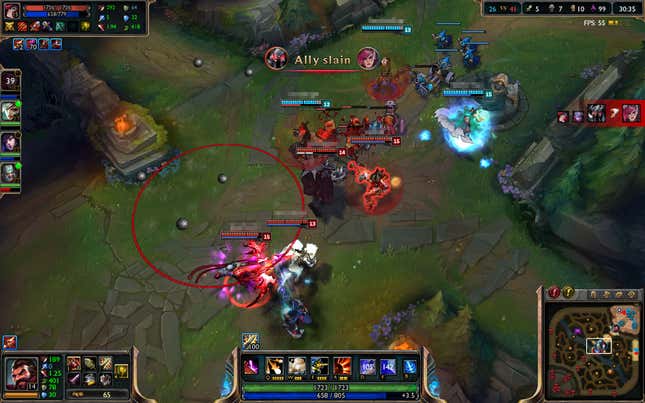
This is the fast-paced end-game when everyone's fully leveled up and a) trying to kill one another and b) taking out the last of the enemy defenses. Mistakes make everyone upset now. Timing is always important in League, but by late-game every millisecond is crucial. Misfiring or stepping in the wrong direction during a five-vs.-five team fight can be the difference between killing one or more of your opponents and being forced to sit through minute-plus cooldowns before you respawn. A group of fully-powered champions will decimate a base's defenses with lightning speed if nobody's standing guard, so even if you're not dead you could easily lose your last turrets in the time it takes to run back down a lane to try and help.
Everyone's blood is pumping by late-game, so losing your cool with a blurted-out "GODDAMMIT" or "fuck that guy" is understandable. As is calling it quits. People will start surrender votes. But unless the majority agrees to one, you just have to keep playing. Leaving a game by either stepping away from your computer or quitting League entirely is met with swift retribution—the League game client will suspend you from logging on or playing for days or even weeks, or demote you in matchmaking queues so you have to wait several minutes before joining any future games.
Things take a turn for the toxic when tensions within a team finally come to a head. Troll teammates will act as if they've been vindicated for all their "lol this team" comments from earlier. Whole teams might turn on one person who stumbled early on and fed an opposing champion. People don't hold back: criticisms of targeted teammates range from "plz uninstall" to "go to hell" or "kill yourself."
Post-Game: "GGWP"
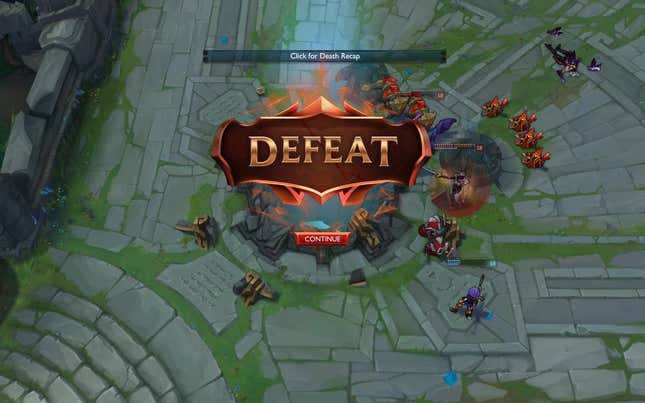
Both teams are able to chat freely with one another, ostensibly so they can rehash everything that unfolded beforehand. Common practice dictates that you're supposed to type out "gg," the universal abbreviation for "good game." You can tell someone is looking for a fight if they interrupt the other players rattling off "gg" one after another to just type: "no."
Free from the confines of having to actually play League of Legends, especially bitter players start venting to the enemy team or asking them to report one of their former allies. You can just walk away. But after suffering through the last game with a jerk or several, there is a strong temptation to stick around and finally let some piece of shit really have it.
You might be asking yourself right about now: "Why all the anger? Isn't this game supposed to be, ya know, fun?"
Well, yes. League of Legends is fun. But it's also a brutal, punishing game. Much of its difficulty stems from the way its in-game economy works. A team that starts out with an early lead has an easier time killing opponents and farming gold, which helps them acquire more powerful stuff in turn, which makes them have an even easier time killing opponents and farming gold. Being on the losing side of this equation is degrading. Teammates rubbing your nose in your own failures by calling you things like "feeder" adds insult to injury. You can mute these people if you want to. But since you can't just up and leave a game once you feel you've crossed the point of no return, you're still forced to just sit there and suffer as the cumulative results of all your team's mistakes unfold before you.
Teamwork is a delicate balancing act in League of Legends, one that often leaves you feeling incredibly vulnerable. Working with a teammate or two to do something as simple as luring an enemy into an ambush requires each of you to stick your neck out and put your champion's life on the line.
If the opposition outmaneuvers you or things go awry in some other relatively blameless way, everybody accepts it and moves on. But if you mess up your timing, misfire a special ability, or—god help you—panic and press the wrong button? You haven't just made a personal blunder. You've also made your teammate look like an idiot. They probably start feeling like one for trusting you, too.
Once a game takes a turn for the worse, your allies can easily start to seem like the real enemies you're up against. Toxic behavior can become understandable, even seem justified, in this context.
A mistake or two can go over with only minor snippets between players. But things add up fast. Remember: dying at the hands of an opponent doesn't just mean that you respawn and start all over again. The champion gained both gold and experience for killing you, so he's now a more formidable opponent as a result. You start from a fundamentally weaker position than the one you just left in turn. If this happens more than once, a gold and experience deficit starts to manifest between your team and the one in the lead. Winning isn't just a matter of pulling off the best moves or coordinating effective maneuvers with your teammates anymore. Now, you have to work against the natural inertia of the game to put yourself back in the fight.
League games unfold at a rapid clip—taking a total of 30, maybe 45 minutes—so it doesn't take very long to recognize things aren't going well for you or your team. Excitement or trepidation quickly gives way to anguish, and then resentment. Everyone starts to wonder where things went awry.
This could be a moment of genuine self-reflection. But for many players, asking, "What went wrong?" can easily translate to: "Who can I blame for this disaster of a game?" And once people start thinking that way, causing a scene starts to seem a whole lot easier than continuing to play the game.
Toxicity Is Not The Standard Operating Procedure
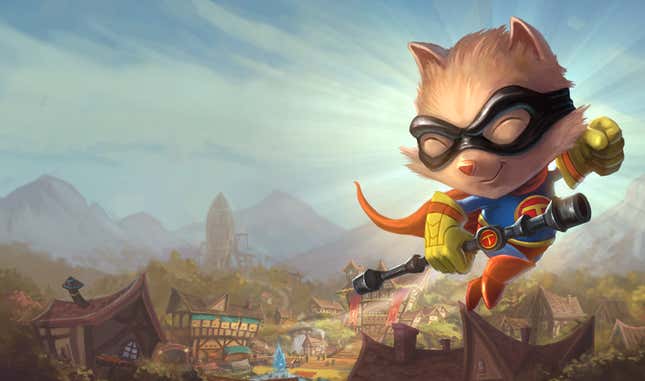
Toxic behavior isn't actually the norm. It's the opposite. At least, that seems to be the case at this point in the game's history. Late last year, Riot said that 95 percent of its players had never received a punishment of any kind. Generally speaking, my experience with League confirms this. I played the game for almost two months before I encountered a player who caused such a scene I felt obligated to report him.
That said, I've also noticed a sharp uptick in player hostility ever since I've started being grouped into more competitive games with comparatively advanced players. I'm still only at level 17 in my League profile, which means I have a long ways to go before breaking into high-level games or playing in the fiercely competitive "ranked" mode (which requires you to be at level 30 just to access). All the more seasoned League vets I've spoken to have essentially told me that from here on it, it's more of the same. Only things get more intense, and players become much more irascible, as the stakes of a game are raised.
Still, there's a tangible pull in League of Legends to play nice. Or at least play civil. It's a fiercely competitive, team-based game. Playing it well enough to beat an opposing team requires you to communicate efficiently with all four of your teammates on an ongoing basis. The stuff people refer to when talking about toxicity and toxic behavior—screaming out slurs, threatening to kill one another, etc.—disrupts this communication. Hell, just taking the time to type out some horrible death threat means that you're giving up a precious few seconds you could be using to, say, send your character back to base to buy some new armor. Or dodge out of the way of an incoming attack. Even if you are in a terrible mood while playing, then, it's far easier to go with the flow and keep playing rather than stamp your feet and cause a scene.
Winning isn't everything in League, but it's damn near close to everything. The exceedingly tense climate of the game therefore also fosters a spirit of collaboration—however begrudging it may be. It's not really that surprising, then, that the League of Legends community has earned such high marks from the game's developer.
A Lot Of What Makes League Toxic Also Makes It Fun
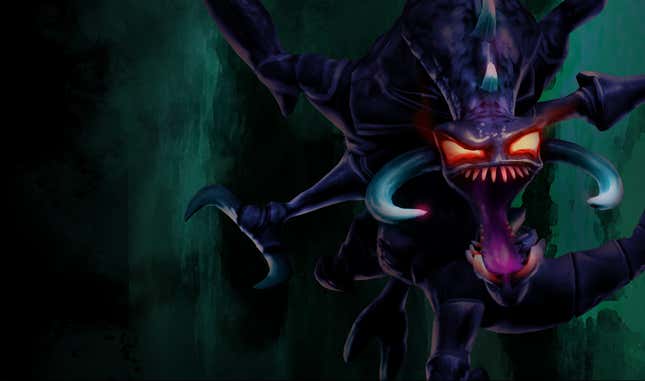
There's one thing that makes me question the legitimacy of Riot's statistical breakdown of toxic behavior: the prolonged hazing process one must go through when starting out in League of Legends.
The game is famously opaque for newcomers, thanks in large part to the fact that it has a laughably insubstantial tutorial process for a game so ornately challenging. Players are pretty much on their own when trying to break into League and fit in with its massive online community. The only way to do so is to dive in and start playing.
Learning how to play—and, much later, how to play well—involves a lot of being yelled at by more experienced teammates and doing your best to glean genuine insight from their emotionally fraught feedback. These de facto mentors can be very nice, and many are. But it's distressing how little it can take sometimes for someone to switch from telling you you're feeding, to accusing you of being a feeder, to calling you a faggot. The overriding pressure newcomers often feel in these moments is to swallow their pride, accept that they did something wrong, and try and move on.
Over time, players start to toughen up their skin against verbal abuse the same way they learn to do everything else in League. If that sounds like an unsettling way to deal with toxic behavior? Well, it's also an empowering, even beautiful aspect of many other parts of the game.
Not every piece of work is supposed to be easy. Oppressively difficult games are often the most rewarding ones to play. League of Legends' inhospitality might help its community's most unseemly elements take shape and give them a powerful voice. But it's also a large part of what makes the game so special.
Illustration by Jim Cooke
CORRECTION (1:00 pm): A previous version of this article said that you can select "items and power-ups" during the champion selection portion of a League of Legends game. This was inaccurate. I was referring to the special spells each champion can outfit themselves with prior to the start of the game, which are known as "Summoner spells." Items are only available to purchase at the shop once you leave the champion selection screen and begin playing on the map.
Contact the author at yannick.lejacq@kotaku.com.